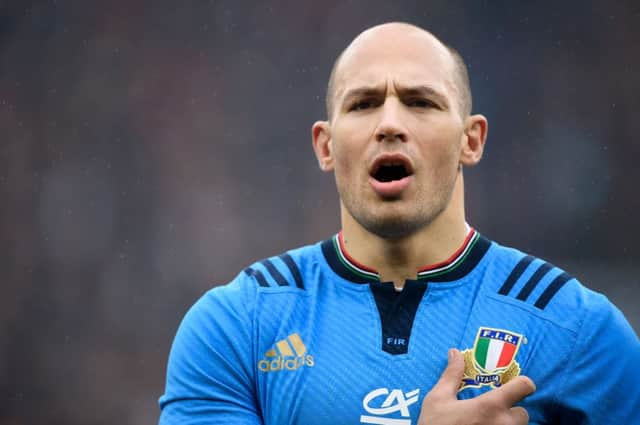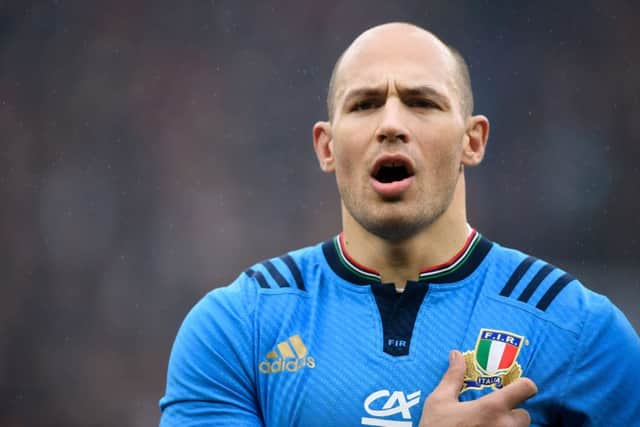Simon Taylor: Sergio Parisse remains an enigma


He displays only occasional glimpses of exasperation at the unfairness of it all, and largely seems to accept the situation for what it is, concentrating on doing all he can for his team. That same kind of exasperation was writ large in the body language of Stuart Hogg, Scotland’s world class talent, last season; a young, gifted guy coming to the realisation that playing for Scotland is an uphill struggle, and that the reality doesn’t necessarily correspond to the boyhood aspiration. But he too, to his great credit, has quickly learned to channel his energies positively and is again at the forefront of how Scotland are trying to play.
Parisse is an interesting character. I was with him for three seasons at Stade Francais and have to admit to at first coming over a bit giddy schoolgirl-ish at the prospect of playing alongside him. Sure enough, my dubious expectations were met; handsome, charming, fluent in four languages and one of the fittest, strongest and most all-round skilful guys at the club. Nevertheless, Fabien Galthie, the coach at the time, seemed to take an odd liking to me, and I played at least as many games as Parisse did at No 8 that year. And perhaps this was partly down to the fact that he was one of those players who played better for his country than for his club.
Advertisement
Hide AdAdvertisement
Hide AdFor Italy, he would often be the standout player on the pitch, even when they were beaten by 20 points, whereas for Stade his play could be more workaday. It struck me that maybe he preferred the adversity of playing for his country and knowing that if he didn’t perform, neither would his team, to the situation at his club, where he was just one star in a squad full of them.


Stade have since gone through a number of very difficult years, both on and off the pitch, and Parisse has stuck with them through it all and has been key to taking them back to a position where they are again challenging for the Top 14 title. His loyalty has to be admired, especially when he could have named his price at any club in Europe, but is it evidence that he needs that extra layer of challenge to be found at a struggling club to keep him fully motivated?
One doubt there might be about him is whether, as an all-time great, he has managed to have a sustained effect on the culture of his team. Almost every squad pays lip service to the concept that “the players have to drive improvements”. But it takes a very specific type of character, a Paul O’Connell say, to genuinely do it; to have the energy, drive and inclination to push yourself in training every day whilst also drumming the expected standards into those around you. You just wonder if the individualist, lone-warrior streak in Parisse has prevented him having a wider impact over his squad as a whole.
As for Italy’s current position, in relation to 2011, when Jacques Brunel took over as coach, their situation remains prima facie unchanged. There have been those famous wins over Ireland and France, and they are certainly as physical and dogged as ever, but there is a sense that Brunel’s reign is petering out. They clearly have had problems for years in finding a long-term solution at stand-off (we know that feeling) and Kelly Haimona is the latest guy to be given a shot. He is undoubtedly a decent player, but he brings a bizarre approach to ten play – he seems to spend half his time standing at centre or on the wing, allowing Luke McLean to play first receiver, and against Ireland he must have hit 15 rucks, surely a world record for a fly half.
Meanwhile, the recall for the England game of the super-veterans Mauro Bergamasco and Marco Bortolami, followed by their immediate release back to their Parman pasture, hints at a lack of faith in the young players coming through, or at the very least a lack of a coherent selection policy.
Of course, Scotland and Italy are on a similar plane in the rugby universe but unfortunately today’s game presents more of a no-win situation for Scotland. A victory is expected, and will not serve to fully banish the disappointment of the Wales match. Nonetheless, it will be great to see the Scotland team sticking to their guns and again playing adventurous, try-scoring rugby. Just be mindful of that man Parisse. Oh, and interceptions.